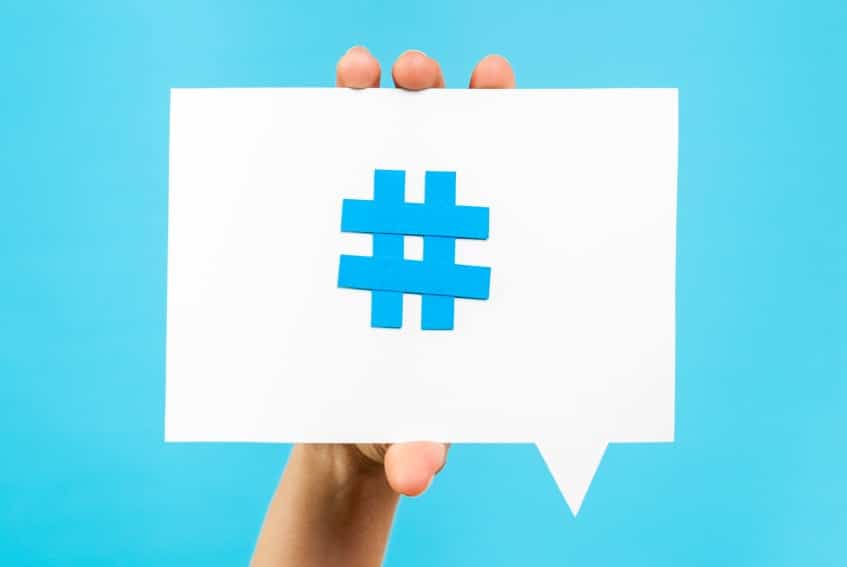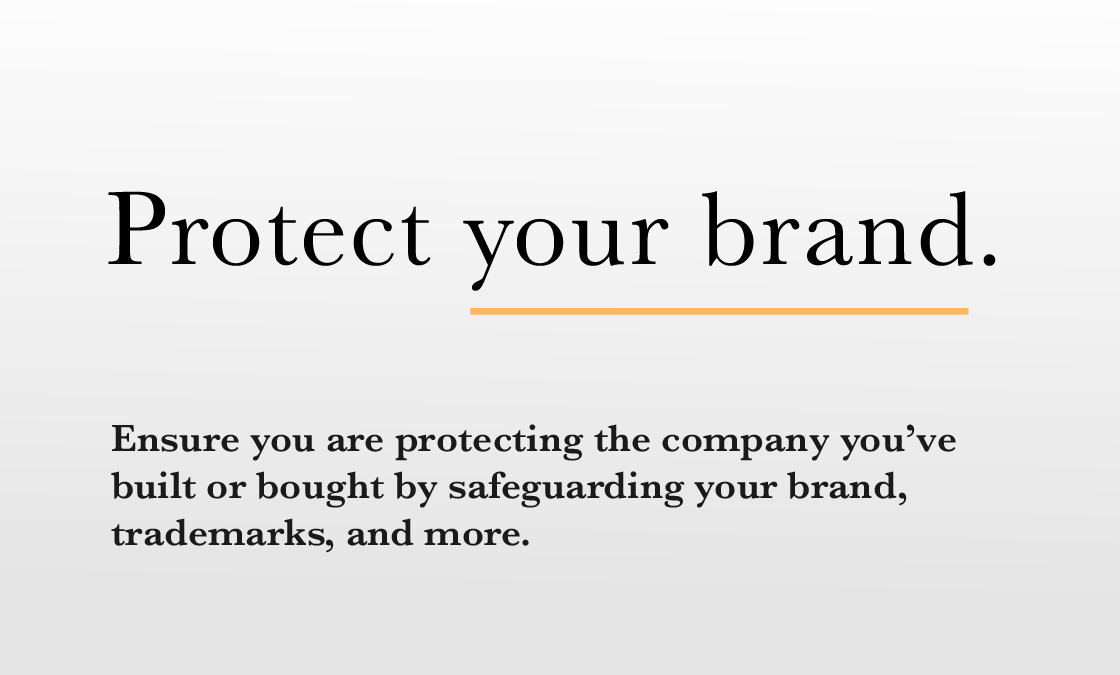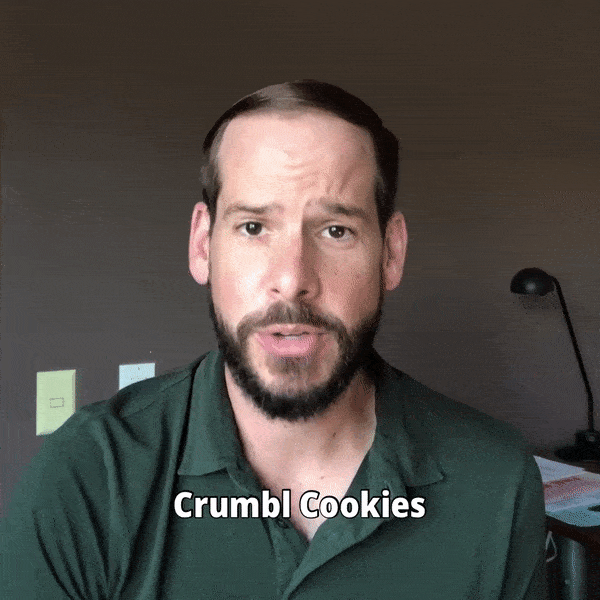Once the sole province of Twitter users, the hashtag is everywhere now — on social networks, products, television and at political events. Hashtags are increasingly used to market a wide range of products, services, events and brands.
If your business wants to use a hashtag as part of a marketing campaign, can you trademark it? The answer is probably yes, as long as it is not already in use and not likely to create confusion with another business or product. The US Patent and Trademark Offices looks at a number of factors to evaluate whether any word, phrase, symbol design or hashtag can be trademarked.
Should you trademark your hashtag? That may be a much more complicated question.
Trademarks are for Business
As a threshold matter, you must demonstrate to the USPTO that you intend to use the hashtag to promote or sell your products or services. Trademarking a hashtag will not prevent others from using it in noncommercial ways, including ways to which may object. Public policy considerations weigh against reserving combinations of words, phrases or symbols for one person’s or group’s sole use in general public discourse. Trademark protection is designed to prevent a form of unfair competition. Its sole function is to prevent companies and service providers within the same industry from using something associated with your business identity to compete against you.
What Marks, Including Hashtags, Can be Trademarked?
In general, the USPTO looks at several factors when determining whether to permit registration. In one way or another, many of these factors get to the issue of whether there is a “likelihood of confusion” between your proposed mark and a mark that is already registered, or for which there is a pending application. Marks may create confusion when:
- the marks are similar, and the goods and or services of the parties are related such that consumers would mistakenly believe they come from the same source.
- The mark is a “weak” or descriptive mark, rather than a “strong” mark, which generally means that it is arbitrary, fanciful or suggestive.
Similar Marks/Similar Products
Similarity in sound, appearance, and or meaning may be sufficient to support a finding that confusion is likely, but only if the products themselves are related. Trying to register the name “Mickey D’s” for a business that sells fast food would be less likely to succeed than trying to register the same name for a business that sells office equipment. In the same vein, registering “#Occupy Walnut Avenue” for a political organization would be less likely to be approved than the same hashtag for a residential real estate brokerage. The same is true of translations into other languages. #BlackCat might be thought to create confusion with #ChatNoir if the products were also similar.
The first step in any trademark application, therefore, is some comprehensive research into similar names, logos or hashtags that are already in use. The USPTO maintains a searchable list of trademarks that have been registered or applied for. A quick check with a website, such as Twubs, may tell you if a hashtag is already in use.
Strong vs. Weak
It is very difficult to protect generic terms, like “beverage” or “hat” from infringement. Prohibiting the use of such terms in commerce would simply be impossible. Donald Trump’s application to register the phrase “You’re fired!” was denied, for obvious reasons. The USPTO generally looks more favorably in terms that are invented like “Exxon,” which, at least originally, had no generic meaning.
Hashtags that are arbitrary, fanciful or suggestive are more likely to be accepted for registration than those that are generic or merely descriptive. Although #cheese might not be accepted, #FriendlyFred’sCheese for a cheese marketer might be sufficiently distinctive.
Other Issues that the USPTO Will Consider
In addition, the USPTO may refuse registration where a mark is a surname; a geographic description of the origin of the goods or services; disparaging or offensive; a foreign term that translates to a descriptive or generic term; an individual’s name or likeness; the title of a single book or movie; and something that is used in a purely ornamental manner.
If you plan to market your goods or services in another language under the same mark, you should also be sure to double check the translation and other cultural connotations to avoid comic or offensive results. Marketing lore is full of unfortunate examples, such as the California Milk Processor Board’s “Got Milk?” campaign that came across as a weirdly intrusive inquiry about lactation in Spanish.
Twitter’s Trademark Policy
Twitter prohibits the use of a company or business name, logo, or other trademark-protected materials in a manner that may mislead or confuse others with regard to its brand or business affiliation. It may suspend the user’s account where there is clear evidence of an intent to mislead. For less serious violations, the account holder may have an opportunity to clear up any potential confusion.
Should You Trademark Your Hashtag?
There are two sides to this question, of course, and both can be fairly compelling. It depends largely on your business’s future plans for the hashtag.
The Case for Federal Trademark Registration
You may have been aware of the benefits of federal trademark protection long before you got to the hashtag issue. Perhaps you have already registered your business name, dba, logo and other signature business identifiers.
Without federal trademark registration, you will have only common law protection or perhaps protection under state law, though few people register for that. Both are quite limited.
Common law rights are created through use and only apply in the geographic area in which the product is marketed. Since there is no registration it is hard to know whether another similar business is using the name, symbol or hashtag. State law registration is also limited to the state. Both situations make expansion very difficult. With either, you could lose the years of work that you spent developing a reputation and goodwill for your business, when an out-of-state or out-of-area competitor uses the same hashtag.
Federal trademark registration, on the other hand, creates a legal presumption that you own the mark, (or business name, brand name, or whatever you have registered) and have the exclusive right to use it nationwide. It also gives you the right to sue someone in federal court for infringing on it.
If your hashtag is an important element of a marketing campaign that you intend to use for a long period of time, by all means seek federal registration.
The Case against Federal Trademark Registration
The first issue is principally about time. One reason that social media marketing is fun and fresh is because it’s ephemeral. A decision on a trademark application, on the other hand, may take six or seven months. If you intended to use the hashtag in only a quick, temporary fashion, it may not be worth the cost and effort, even though your application for trademark protection will take precedence over any later applications for the same hashtag. A search to determine whether it is already in use may be enough.
Secondly, because of the viral nature of hashtag marketing, you may actually not want to discourage people from using it freely. Even a technically infringing use may work to your benefit if your business is already strongly identified with a hashtag.
Trademark law is also not self-enforcing. The general rule is that a trademark is worth only what you are willing to do to defend it. That does not necessarily mean endless litigation; many issues can be solved with an attorney’s demand letter, but you should be aware that a trademark that is valuable to your business will likely require vigorous effort to protect. Many businesses engage trademark monitoring services to actively monitor for infringements and a business attorney to follow up.
Others suggest that hashtags marketing campaigns are, well, a little 2013 at this point. The fact that hashtags are everywhere may mean that the fad that has run its course. They have their haters, and they have become a staple of late night comedy. Is it over? Instant messaging apps may now be moving into the trendy marketing arena that Twitter once owned.
There is nothing peculiar about hashtags that prevent businesses from applying for federal trademark protection. The USPTO’s review process will consider whether the hashtag is unique or likely to create confusion on the basis of many of the same factors that would come into play with any trademark application. Twitter will enforce its trademark policy based on many of the same considerations.
Whether it’s a good idea to trademark your hashtag will depend on what role you see it playing in your business’s marketing future. If you expect it to have an important and relatively long-term role, and your business is willing to protect it through the legal process, if necessary, then applying for federal trademark protection may be the right move.
Federal trademark registration is not required, however. If you see a more minor role for the hashtag, it may be enough to do a careful check to ensure that it is not already in use, so that your business is not infringing and then rely on common law protection.
Is hashtag marketing a good move? It’s hard to say, but worth asking your marketing gurus about.


![Law in the Digital Age: Exploring the Legal Intricacies of Artificial Intelligence [e323]](https://www.pashalaw.com/wp-content/uploads/2023/11/WhatsApp-Image-2023-11-21-at-13.24.49_4a326c9e-1024x723.jpg)


![Is it all over? | Behind the Buy [7/8] [308]](https://www.pashalaw.com/wp-content/uploads/2020/09/iStock-1153248856-overlay-scaled-1024x683.jpg)
![Fight for Your [Trademark] Rights | Behind the Buy [6/8] [307]](https://www.pashalaw.com/wp-content/uploads/2020/07/Fight-for-your-trademark-right-1024x683.jpg)





![Law in the Digital Age: Exploring the Legal Intricacies of Artificial Intelligence [e323]](https://www.pashalaw.com/wp-content/uploads/2023/11/WhatsApp-Image-2023-11-21-at-13.24.49_4a326c9e-300x212.jpg)
![Unraveling the Workforce: Navigating the Aftermath of Mass Layoffs [e322]](https://www.pashalaw.com/wp-content/uploads/2023/07/Untitled-design-23-300x212.png)
![Return to the Office vs. Remote: What Can Employers Legally Enforce? [e321]](https://www.pashalaw.com/wp-content/uploads/2023/01/Pasha_LSSB_321_banner-300x212.jpg)
![Explaining the Hans Niemann Chess Lawsuit v. Magnus Carlsen [e320]](https://www.pashalaw.com/wp-content/uploads/2022/10/LAWYER-EXPLAINS-7-300x169.png)
![California v. Texas: Which is Better for Business? [313]](https://www.pashalaw.com/wp-content/uploads/2021/07/Pasha_LSSB_CaliforniaVSTexas-300x212.jpg)
![Buyers vs. Sellers: Negotiating Mergers & Acquisitions [e319]](https://www.pashalaw.com/wp-content/uploads/2022/06/Pasha_LSSB_BuyersVsSellers_banner-300x212.jpg)
![Employers vs. Employees: When Are Employment Restrictions Fair? [e318]](https://www.pashalaw.com/wp-content/uploads/2022/05/Pasha_LSSB_EmployeesVsEmployers_banner-1-300x212.jpg)
![Vaccine Mandates Supreme Court Rulings [E317]](https://www.pashalaw.com/wp-content/uploads/2022/02/WhatsApp-Image-2022-02-11-at-4.10.32-PM-300x212.jpeg)
![Business of Healthcare [e316]](https://www.pashalaw.com/wp-content/uploads/2021/11/Pasha_LSSB_BusinessofHealthcare_banner-300x212.jpg)
![Social Media and the Law [e315]](https://www.pashalaw.com/wp-content/uploads/2021/10/WhatsApp-Image-2021-10-06-at-1.43.08-PM-300x212.jpeg)
![Defining NDA Boundaries: When does it go too far? [e314]](https://www.pashalaw.com/wp-content/uploads/2021/09/Pasha_LSSB_NDA_WordPress-2-300x212.jpg)
![More Than a Mistake: Business Blunders to Avoid [312] Top Five Business Blunders](https://www.pashalaw.com/wp-content/uploads/2021/06/Pasha_LSSB_Blunders_WP-1-300x212.jpg)
![Is There a Right Way to Fire an Employee? We Ask the Experts [311]](https://www.pashalaw.com/wp-content/uploads/2021/02/Pasha_LSSB_FireAnEmployee_Website-300x200.jpg)
![The New Frontier: Navigating Business Law During a Pandemic [310]](https://www.pashalaw.com/wp-content/uploads/2020/12/Pasha_LSSB_Epidsode308_Covid_Web-1-300x200.jpg)
![Wrap Up | Behind the Buy [8/8] [309]](https://www.pashalaw.com/wp-content/uploads/2020/11/Pasha_BehindTheBuy_Episode8-300x200.jpg)
![Is it all over? | Behind the Buy [7/8] [308]](https://www.pashalaw.com/wp-content/uploads/2020/09/iStock-1153248856-overlay-scaled-300x200.jpg)
![Fight for Your [Trademark] Rights | Behind the Buy [6/8] [307]](https://www.pashalaw.com/wp-content/uploads/2020/07/Fight-for-your-trademark-right-300x200.jpg)
![They Let It Slip | Behind the Buy [5/8] [306]](https://www.pashalaw.com/wp-content/uploads/2020/06/Behind-the-buy-they-let-it-slip-300x200.jpg)
![Mo’ Investigation Mo’ Problems | Behind the Buy [4/8] [305]](https://www.pashalaw.com/wp-content/uploads/2020/05/interrobang-1-scaled-300x200.jpg)
![Broker or Joker | Behind the Buy [3/8] [304] Behind the buy - Broker or Joker](https://www.pashalaw.com/wp-content/uploads/2020/04/Joker-or-Broker-1-300x185.jpg)
![Intentions Are Nothing Without a Signature | Behind the Buy [2/8] [303]](https://www.pashalaw.com/wp-content/uploads/2020/04/intentions-are-nothing-without-a-signature-300x185.jpg)
![From First Steps to Final Signatures | Behind the Buy [1/8] [302]](https://www.pashalaw.com/wp-content/uploads/2020/04/first-steps-to-final-signatures-300x185.jpg)
![The Dark-side of GrubHub’s (and others’) Relationship with Restaurants [e301]](https://www.pashalaw.com/wp-content/uploads/2015/04/When-Competition-Goes-Too-Far-Ice-Cream-Truck-Edition-300x201.jpg)
![Ultimate Legal Breakdown of Internet Law & the Subscription Business Model [e300]](https://www.pashalaw.com/wp-content/uploads/2019/05/Ultimate-Legal-Breakdown-of-Internet-Law-the-Subscription-Business-Model-300x196.jpg)
![Why the Business Buying Process is Like a Wedding?: A Legal Guide [e299]](https://www.pashalaw.com/wp-content/uploads/2019/03/futura-300x169.jpg)
![Will Crowdfunding and General Solicitation Change How Companies Raise Capital? [e298]](https://www.pashalaw.com/wp-content/uploads/2018/11/Will-Crowdfunding-and-General-Solicitation-Change-How-Companies-Raise-Capital-300x159.jpg)
![Pirates, Pilots, and Passwords: Flight Sim Labs Navigates Legal Issues (w/ Marc Hoag as Guest) [e297]](https://www.pashalaw.com/wp-content/uploads/2018/07/flight-sim-labs-300x159.jpg)
![Facebook, Zuckerberg, and the Data Privacy Dilemma [e296] User data, data breach photo by Pete Souza)](https://www.pashalaw.com/wp-content/uploads/2018/04/data-300x159.jpg)
![What To Do When Your Business Is Raided By ICE [e295] I.C.E Raids business](https://www.pashalaw.com/wp-content/uploads/2018/02/ice-cover-300x159.jpg)
![General Contractors & Subcontractors in California – What you need to know [e294]](https://www.pashalaw.com/wp-content/uploads/2018/01/iStock-666960952-300x200.jpg)
![Mattress Giants v. Sleepoplis: The War On Getting You To Bed [e293]](https://www.pashalaw.com/wp-content/uploads/2017/12/sleepopolis-300x159.jpg)
![The Harassment Watershed [e292]](https://www.pashalaw.com/wp-content/uploads/2017/12/me-2-300x219.jpg)
![Investing and Immigrating to the United States: The EB-5 Green Card [e291]](https://www.pashalaw.com/wp-content/uploads/2012/12/eb-5-investment-visa-program-300x159.jpg)
![Responding to a Government Requests (Inquiries, Warrants, etc.) [e290] How to respond to government requests, inquiries, warrants and investigation](https://www.pashalaw.com/wp-content/uploads/2017/10/iStock_57303576_LARGE-300x200.jpg)
![Ultimate Legal Breakdown: Employee Dress Codes [e289]](https://www.pashalaw.com/wp-content/uploads/2017/08/Ultimate-Legal-Breakdown-Template-1-300x159.jpg)
![Ultimate Legal Breakdown: Negative Online Reviews [e288]](https://www.pashalaw.com/wp-content/uploads/2017/06/Ultimate-Legal-Breakdown-Online-Reviews-1-300x159.jpg)
![Ultimate Legal Breakdown: Social Media Marketing [e287]](https://www.pashalaw.com/wp-content/uploads/2017/06/ultimate-legal-breakdown-social-media-marketing-blur-300x159.jpg)
![Ultimate Legal Breakdown: Subscription Box Businesses [e286]](https://www.pashalaw.com/wp-content/uploads/2017/03/ultimate-legal-breakdown-subscription-box-services-pasha-law-2-300x159.jpg)
![Can Companies Protect Against Foreseeable Misuse of Apps [e285]](https://www.pashalaw.com/wp-content/uploads/2017/01/iStock-505291242-300x176.jpg)
![When Using Celebrity Deaths for Brand Promotion Crosses the Line [e284]](https://www.pashalaw.com/wp-content/uploads/2017/01/celbrity-300x159.png)
![Are Employers Liable When Employees Are Accused of Racism? [e283] Racist Employee](https://www.pashalaw.com/wp-content/uploads/2016/12/Are-employers-liable-when-an-employees-are-accused-of-racism-300x159.jpg)
![How Businesses Should Handle Unpaid Bills from Clients [e282] What to do when a client won't pay.](https://www.pashalaw.com/wp-content/uploads/2016/12/How-Businesses-Should-Handle-Unpaid-Bills-to-Clients-300x159.png)
![Can Employers Implement English Only Policies Without Discriminating? [e281]](https://www.pashalaw.com/wp-content/uploads/2016/11/Can-Employers-Impliment-English-Only-Policies-Without-Discriminating-300x159.jpg)
![Why You May No Longer See Actors’ Ages on Their IMDB Page [e280]](https://www.pashalaw.com/wp-content/uploads/2016/10/IMDB-AGE2-300x159.jpg)
![Airbnb’s Discrimination Problem and How Businesses Can Relate [e279]](https://www.pashalaw.com/wp-content/uploads/2016/09/airbnb-300x159.jpg)
![What To Do When Your Amazon Account Gets Suspended [e278]](https://www.pashalaw.com/wp-content/uploads/2016/09/What-To-Do-When-Your-Amazon-Account-Gets-Suspended-1-300x200.jpg)
![How Independent Artists Reacted to Fashion Mogul Zara’s Alleged Infringement [e277]](https://www.pashalaw.com/wp-content/uploads/2016/08/How-Independent-Artists-Reacted-to-Fashion-Mogul-Zaras-Alleged-Infringement--300x159.jpg)
![Can Brave’s Ad Replacing Software Defeat Newspapers and Copyright Law? [e276]](https://www.pashalaw.com/wp-content/uploads/2016/08/Can-Braves-Ad-Replacing-Software-Defeat-Newspapers-and-Copyright-Law-300x159.jpg)
![Why The Roger Ailes Sexual Harassment Lawsuit Is Far From Normal [e275]](https://www.pashalaw.com/wp-content/uploads/2016/07/WHY-THE-ROGER-AILES-SEXUAL-HARASSMENT-LAWSUIT-IS-FAR-FROM-NORMAL-300x159.jpeg)
![How Starbucks Turned Coveted Employer to Employee Complaints [e274]](https://www.pashalaw.com/wp-content/uploads/2016/07/iStock_54169990_LARGE-300x210.jpg)
